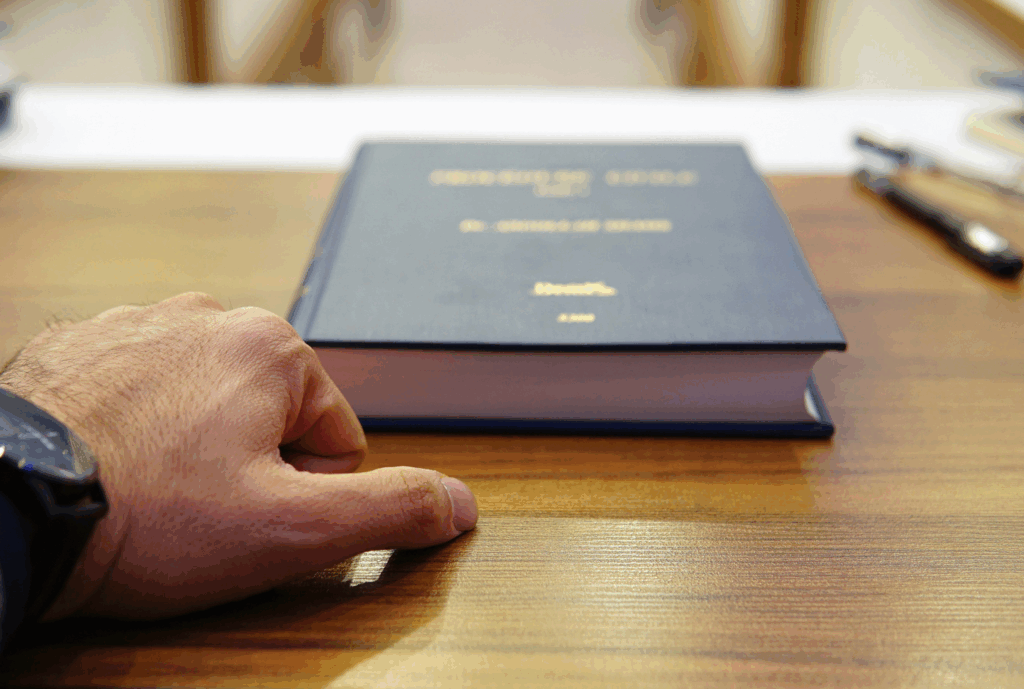Enforcement frequently sounds like a mere legal formality, document after document, decision after decision. But there are real human stories behind every one of those documents, debtors fighting to keep roofs over their heads, creditors seeking justice, lawyers balancing between reality and the law.
It is not uncommon for mistakes to sneak up throughout the process. And that is how we come to the key question of what happens when we encounter irregularities in enforcement proceedings? The answer lies in an important institute of the enforcement law – the appeal for the elimination of irregularities.
Introduction of public enforcement officers – judiciary deloading
Law on Enforcement and Security Interest (ZIO) prescribes the obligation of the public enforcement officer to implement the proceedings quickly and correctly, in accordance with the current regulations, and with respecting the rights of the enforcement debtor and other participants. The introduction of public enforcement officers had produced substantial deloading of the judicial system, but also the need for additional protection. In that sense, a new institute of the appeal for the elimination of irregularities in enforcement proceedings was introduced.
Appeal for the elimination of irregularities in enforcement proceedings
According to the latest amendments to the Law on Enforcement and Security Interest Article 148, an appeal for the elimination of irregularities can be submitted within 8 days of the from the day when the irregularity was committed (unlike the past law where Article 74 provided no deadline). The appeal is decided on by the court or the public enforcement officer within 8 days (unlike the past law where Article 74 provided a 5-day deadline – hence, a much shorter one).
A complaint is allowed against the writ dismissing or rejecting the appeal. Should the appeal be adopted, a claim may be brought before the High Court or the Commercial Appellate Court.
Consequences of the adoption of appeal
If the appeal is founded, the public enforcement officer or the court will order the elimination of irregularities. Also, it is possible to determine the responsibility for compensation for damages resulting from the irregularity in a separate proceeding. In addition, the public enforcement officer or court have the obligation of informing the Ministry of Justice and the Chamber of Public Executors of the determined irregularities.
Who can submit an appeal?
An appeal for the elimination of irregularity can be submitted by the:
– Parties: enforcement creditor and enforcement debtor;
– Participants: persons exercising their right or interest in the enforcement proceedings, but happen not to be parties in the proceedings (e.g. participants of a public auction, buyers in public auctions, secured creditors, persons that have the right which remains after the sale of immovable property, as well as third parties claiming to have ownership rights);
*The question being asked here is can a third party submit an appeal for the elimination of irregularity, the answer is certainly affirmative, however considering that third parties have the third-party complaint at their disposal, there is the additional question of whether it is superfluous. The appeal is submitted to the public enforcement officer implementing the enforcement, or the court should the enforcement be implemented by the court. This system enables legal protection for parties and other participants in the proceedings, along with respecting the regularity of execution and fairness of the procedure. Even though the law provides protection mechanisms, one might wonder: does this work in practice? What frequently happens is that citizens are unaware of their rights or that they are discouraged in the fight against the, as they like to say, “unbeatable system”. That is why it is important to not only be familiar with the law, but also to have courage to use it.
Mistakes are part of the system, but so are corrections
The enforcement proceeding is not immaculate. However, the law has provided instruments for the correction of those mistakes quickly, efficiently and with the aim of safeguarding the trust in the legal system.
The enforcement proceeding, even though often perceived as strict and one-sided, has its own mechanisms of balance. An appeal for the elimination of irregularities in the enforcement proceedings is precisely one of the key pillars of that balance.
An institute complementary with other legal remedies
Unlike the appeal which is filed against the decisions of the court or the public enforcement officer questioning the legality and foundation of those decisions, the appeal for the elimination of irregularities is directed at the treatment during the implementation of enforcement. It does not concern the legal grounds for enforcement, but exclusively the manner in which the enforcement had been implemented.
It means that this legal remedy is available when there is doubt that the treatment of the public enforcement officer was contrary to the law or rules of enforcement, even when the enforcement document itself is indisputable and final.
For example, should the public enforcement officer fail to duly submit the notification of the implemented procedure, the party cannot file a complaint against that procedure since it is not a formal decision. An appeal for the elimination of irregularity can be submitted instead.
This institute is, therefore, complementary with other legal remedies, it does not replace the appeal, complaint or proposal for the dismissal of the decision, but rather serves as an additional mechanism of protection, especially in situations when quick and direct intervention is needed due to the irregularities during enforcement.
Where do these irregularities hide?
Even though the law offers detailed guidelines regarding enforcement, irregularities can still occur in different situations. Here are several provisions and possible irregularities that hide behind these provisions:
1. Exemption from Enforcement (Article 218 of ZIO)
Article 218 of ZIO prescribes items which shall be exempt from enforcement, including some personal items and basic necessities of the enforcement debtor and members of their household, as well as orthopedic devices for disabled persons.
Irregularity: If the enforcement debtor should possess items exempted from enforcement, such as clothing items, footwear, pets or food, and heating for three months, and they have nonetheless been found on the inventory or have been executed, this represents an irregularity. Also, an irregular appraisal that these items can be the subject of enforcement represents a serious mistake.
Example: One of the examples from the practice concerns the situation in which the public enforcement officer has inventoried a motor vehicle. However, that vehicle was specially equipped with an integrated section for persons with disabilities. In this case, due to the irregularity of procedure, an appeal is submitted for the elimination of irregularity since the enforcement has been implemented contrary to the legal regulations.
2. Inventory and serving the writ of execution (Article 220 of ZIO)
Article 220 paragraphs 1 and 2 of ZIO orders that the enforcement debtor shall be informed of the writ of execution immediately prior to the commencement of inventory and that the writ either be served or posted at the inventory site.
Irregularity:
An irregularity will occur if the writ of execution had not been submitted to the enforcement debtor before the commencement of inventory, or if the writ had not been properly posted at the inventory site, thus violating the enforcement debtor’s right to be informed of the proceeding.
3. Writ of Execution Based on Enforceable or Credible Document (Article 66 of ZIO)
The writ of execution shall state the court, the enforcement creditor and the enforcement debtor and their identification details (Article 30), the enforceable document, claim of the enforcement creditor, instruments and subjects of enforcement, notice of entitlement to legal remedies, and other data necessary for implementation of enforcement.
Irregularity:
If the enforcement creditor has not indicated the instrument and the subject of enforcement i.e. has determined the enforcement over the entire property of the enforcement debtor in the enforcement motion, the public enforcement officer shall, without the enforcement creditor’s motion, adopt a decision to determine the instrument and the subject of enforcement, after identifying the enforcement debtor’s property. An appeal for the elimination of irregularities may be filed against this decision within eight days from the day of serving of the decision.
4. Principle of Proportionality (Article 56 of ZIO)
In choosing the instruments and subjects of enforcement in order to settle monetary claims, the public enforcement officer shall take care that the amount of the enforcement debtor’s liability is proportional to the instrument, and the value of the subject of enforcement.
Irregularity::
Irregular determination of the value of the subject of enforcement and the calculation of the level of debt of the enforcement debtor and the appraisal of the least disadvantageous to the enforcement debtor.
Example:
Another example from practice concerns the situation in which the public enforcement officer implements the enforcement over the field which the debtor has been cultivating and whose livelihood depends on it, or over a tractor, with the debtor owning an expensive car at the same time. In this case, seeing as how the field represents the main source of income for the debtor, enforcement over the car which would be less disadvantages for the debtor, would be more appropriate. Due to the irregular choice of the subject of enforcement, an appeal for the elimination of irregularity can be submitted.
Fairness, balance and trust
Hence, even though enforcement proceedings may seem cold and formal, there are real human beings with real problems behind each writ. The Law on Enforcement and Security Interest provides mechanisms that enable for those mistakes to be corrected, thus maintain fairness, balance and trust in the legal system. In a world becoming ever more rapid and complex, it is important to bear in mind that all participants in the proceeding, be they creditors, debtors or third parties, are entitled to protection and the option of correcting the irregularities that may have occurred.
And therefore, if you happen to be a debtor, creditor, or even a third party in the enforcement proceedings, be aware of your rights and never stop fighting for them. The law is here to protect you, and instruments such as the appeal for the elimination of irregularities are there to provide fairness and balance along each step of the enforcement.




